Entrepreneurship & Small Business: Venture Types & Economic Impact
VerifiedAdded on 2023/01/18
|12
|3365
|84
Essay
AI Summary
This essay provides an overview of entrepreneurship and small business management, discussing different types of entrepreneurial ventures such as public, private, and social entrepreneurship, and comparing their similarities and differences. It assesses the impact of small and medium enterprises (SMEs) on the UK economy, highlighting their role in job creation, revenue contribution, and social economy development. The essay also identifies key traits and skills of successful entrepreneurs like Philip Green and Richard Branson, including creativity, competitiveness, discipline, passion, confidence, knowledge, social skills, self-motivation, flexibility, and open-mindedness. The analysis emphasizes the importance of SMEs and entrepreneurial qualities in driving economic growth and social progress.

ENTREPRENEURSHIP AND SMALL BUSINESS MANAGEMENT
Paraphrase This Document
Need a fresh take? Get an instant paraphrase of this document with our AI Paraphraser
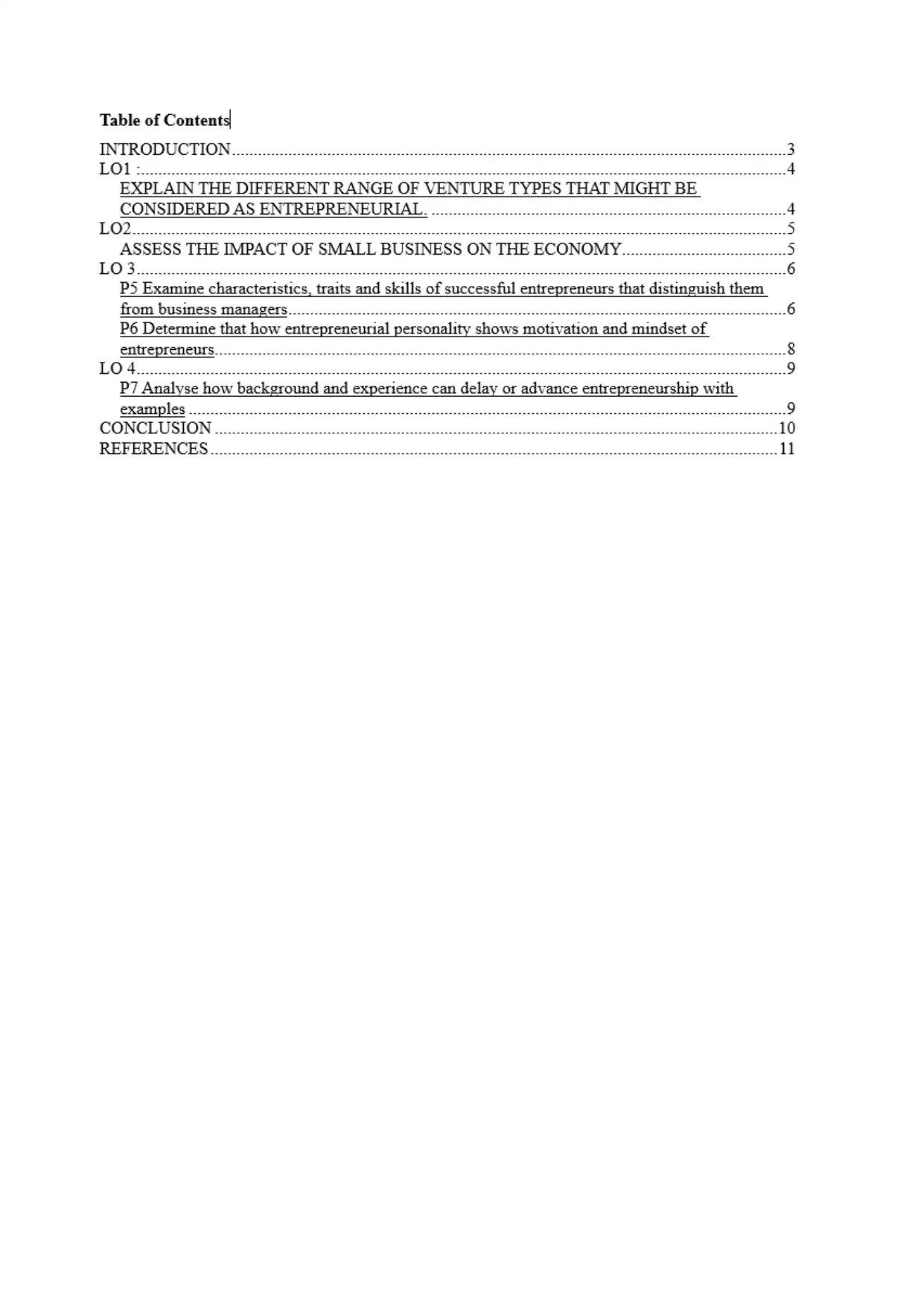

INTRODUCTION
The process of running a new business with a new idea is known as entrepreneurship,
initially entrepreneurship is generally started with a small business. This type of business generally
contains a large amount of risk because the entrepreneur is starting the business with a new product
and this may or may not be suitable for the customers.
Small business management is generally used by the entrepreneur when they start to run
their project. They will be required to manage their employees, finance, assets etc., they certainly
required to make various business decisions
The process of running a new business with a new idea is known as entrepreneurship,
initially entrepreneurship is generally started with a small business. This type of business generally
contains a large amount of risk because the entrepreneur is starting the business with a new product
and this may or may not be suitable for the customers.
Small business management is generally used by the entrepreneur when they start to run
their project. They will be required to manage their employees, finance, assets etc., they certainly
required to make various business decisions
⊘ This is a preview!⊘
Do you want full access?
Subscribe today to unlock all pages.

Trusted by 1+ million students worldwide
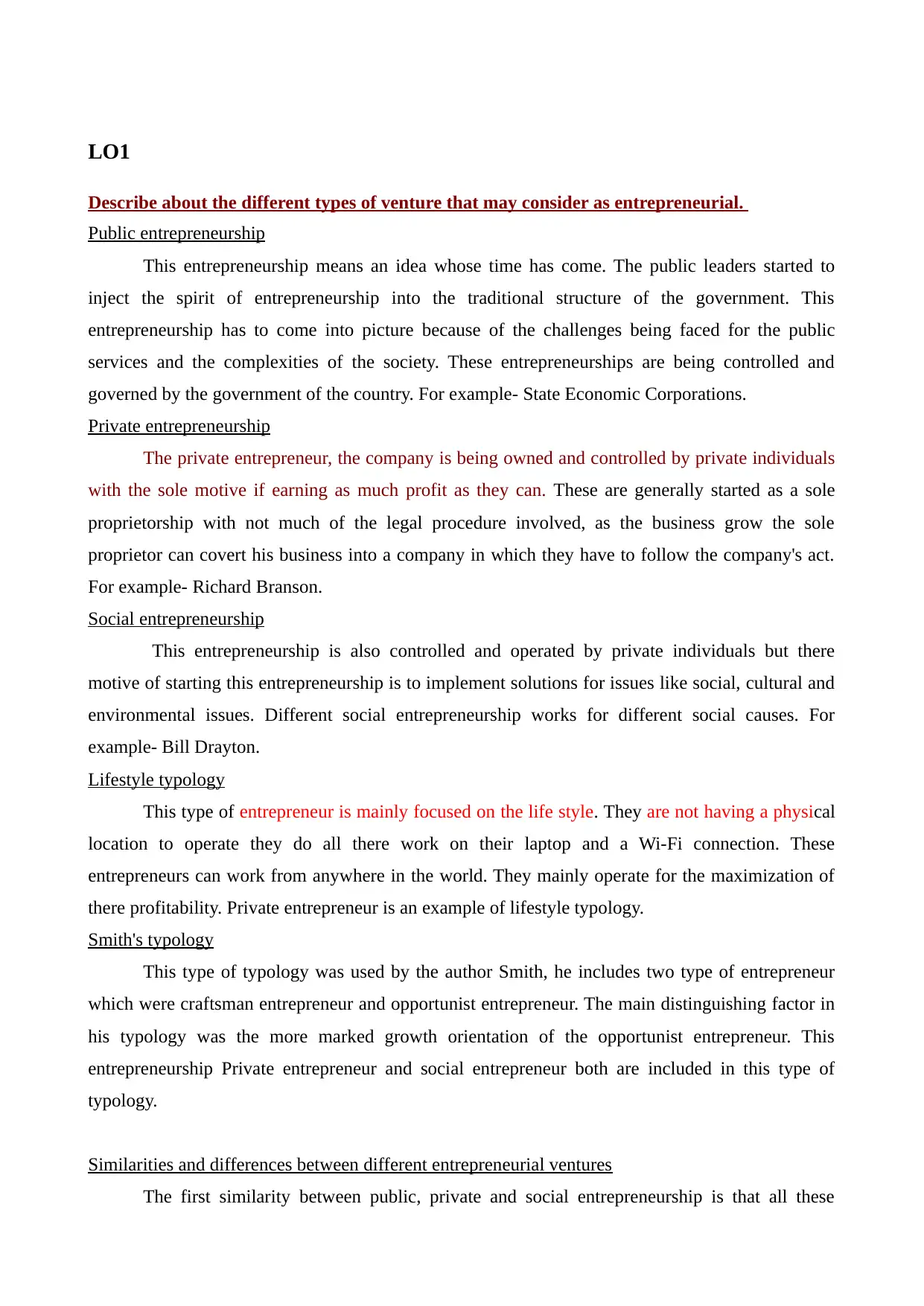
LO1
Describe about the different types of venture that may consider as entrepreneurial.
Public entrepreneurship
This entrepreneurship means an idea whose time has come. The public leaders started to
inject the spirit of entrepreneurship into the traditional structure of the government. This
entrepreneurship has to come into picture because of the challenges being faced for the public
services and the complexities of the society. These entrepreneurships are being controlled and
governed by the government of the country. For example- State Economic Corporations.
Private entrepreneurship
The private entrepreneur, the company is being owned and controlled by private individuals
with the sole motive if earning as much profit as they can. These are generally started as a sole
proprietorship with not much of the legal procedure involved, as the business grow the sole
proprietor can covert his business into a company in which they have to follow the company's act.
For example- Richard Branson.
Social entrepreneurship
This entrepreneurship is also controlled and operated by private individuals but there
motive of starting this entrepreneurship is to implement solutions for issues like social, cultural and
environmental issues. Different social entrepreneurship works for different social causes. For
example- Bill Drayton.
Lifestyle typology
This type of entrepreneur is mainly focused on the life style. They are not having a physical
location to operate they do all there work on their laptop and a Wi-Fi connection. These
entrepreneurs can work from anywhere in the world. They mainly operate for the maximization of
there profitability. Private entrepreneur is an example of lifestyle typology.
Smith's typology
This type of typology was used by the author Smith, he includes two type of entrepreneur
which were craftsman entrepreneur and opportunist entrepreneur. The main distinguishing factor in
his typology was the more marked growth orientation of the opportunist entrepreneur. This
entrepreneurship Private entrepreneur and social entrepreneur both are included in this type of
typology.
Similarities and differences between different entrepreneurial ventures
The first similarity between public, private and social entrepreneurship is that all these
Describe about the different types of venture that may consider as entrepreneurial.
Public entrepreneurship
This entrepreneurship means an idea whose time has come. The public leaders started to
inject the spirit of entrepreneurship into the traditional structure of the government. This
entrepreneurship has to come into picture because of the challenges being faced for the public
services and the complexities of the society. These entrepreneurships are being controlled and
governed by the government of the country. For example- State Economic Corporations.
Private entrepreneurship
The private entrepreneur, the company is being owned and controlled by private individuals
with the sole motive if earning as much profit as they can. These are generally started as a sole
proprietorship with not much of the legal procedure involved, as the business grow the sole
proprietor can covert his business into a company in which they have to follow the company's act.
For example- Richard Branson.
Social entrepreneurship
This entrepreneurship is also controlled and operated by private individuals but there
motive of starting this entrepreneurship is to implement solutions for issues like social, cultural and
environmental issues. Different social entrepreneurship works for different social causes. For
example- Bill Drayton.
Lifestyle typology
This type of entrepreneur is mainly focused on the life style. They are not having a physical
location to operate they do all there work on their laptop and a Wi-Fi connection. These
entrepreneurs can work from anywhere in the world. They mainly operate for the maximization of
there profitability. Private entrepreneur is an example of lifestyle typology.
Smith's typology
This type of typology was used by the author Smith, he includes two type of entrepreneur
which were craftsman entrepreneur and opportunist entrepreneur. The main distinguishing factor in
his typology was the more marked growth orientation of the opportunist entrepreneur. This
entrepreneurship Private entrepreneur and social entrepreneur both are included in this type of
typology.
Similarities and differences between different entrepreneurial ventures
The first similarity between public, private and social entrepreneurship is that all these
Paraphrase This Document
Need a fresh take? Get an instant paraphrase of this document with our AI Paraphraser
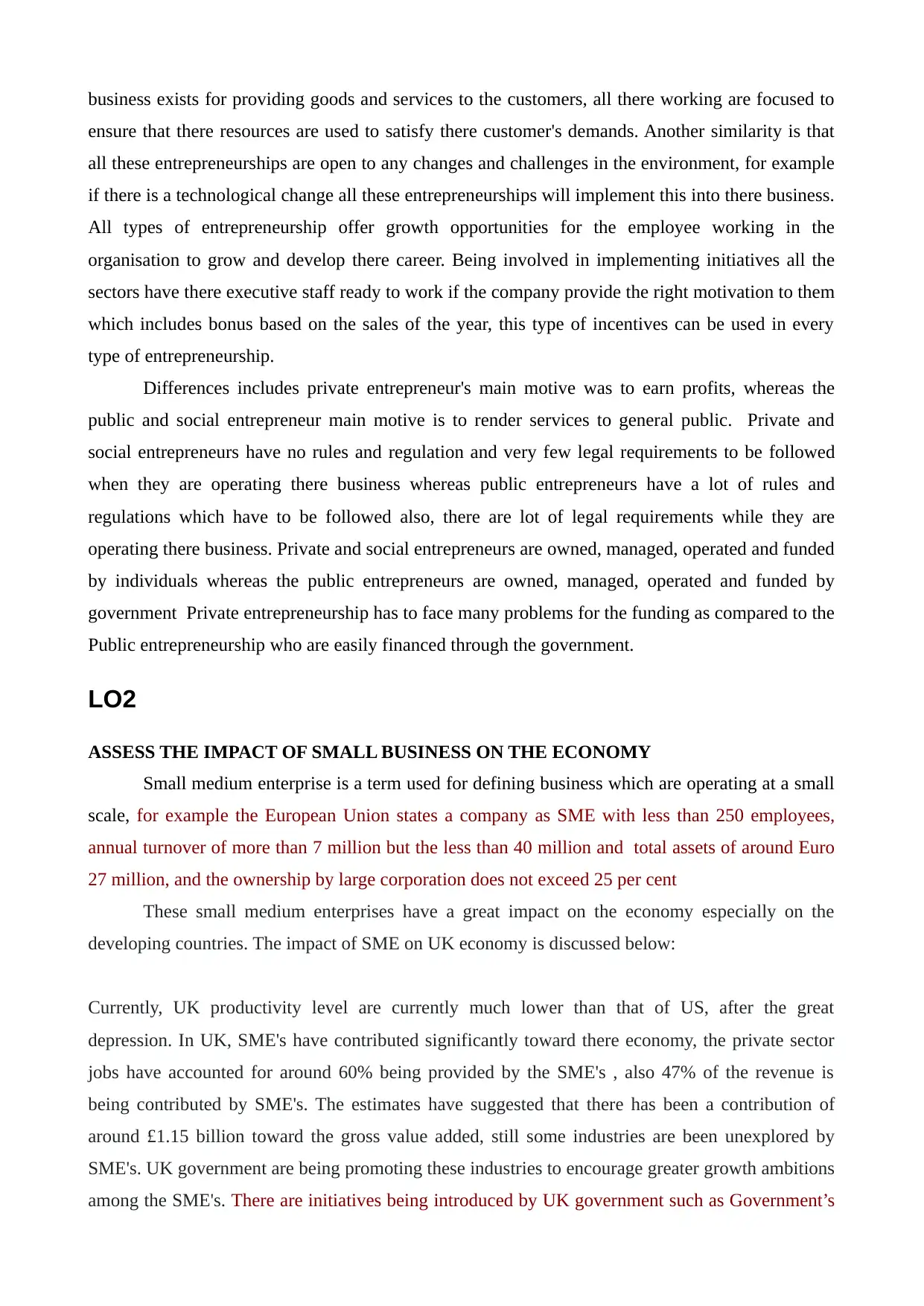
business exists for providing goods and services to the customers, all there working are focused to
ensure that there resources are used to satisfy there customer's demands. Another similarity is that
all these entrepreneurships are open to any changes and challenges in the environment, for example
if there is a technological change all these entrepreneurships will implement this into there business.
All types of entrepreneurship offer growth opportunities for the employee working in the
organisation to grow and develop there career. Being involved in implementing initiatives all the
sectors have there executive staff ready to work if the company provide the right motivation to them
which includes bonus based on the sales of the year, this type of incentives can be used in every
type of entrepreneurship.
Differences includes private entrepreneur's main motive was to earn profits, whereas the
public and social entrepreneur main motive is to render services to general public. Private and
social entrepreneurs have no rules and regulation and very few legal requirements to be followed
when they are operating there business whereas public entrepreneurs have a lot of rules and
regulations which have to be followed also, there are lot of legal requirements while they are
operating there business. Private and social entrepreneurs are owned, managed, operated and funded
by individuals whereas the public entrepreneurs are owned, managed, operated and funded by
government Private entrepreneurship has to face many problems for the funding as compared to the
Public entrepreneurship who are easily financed through the government.
LO2
ASSESS THE IMPACT OF SMALL BUSINESS ON THE ECONOMY
Small medium enterprise is a term used for defining business which are operating at a small
scale, for example the European Union states a company as SME with less than 250 employees,
annual turnover of more than 7 million but the less than 40 million and total assets of around Euro
27 million, and the ownership by large corporation does not exceed 25 per cent
These small medium enterprises have a great impact on the economy especially on the
developing countries. The impact of SME on UK economy is discussed below:
Currently, UK productivity level are currently much lower than that of US, after the great
depression. In UK, SME's have contributed significantly toward there economy, the private sector
jobs have accounted for around 60% being provided by the SME's , also 47% of the revenue is
being contributed by SME's. The estimates have suggested that there has been a contribution of
around £1.15 billion toward the gross value added, still some industries are been unexplored by
SME's. UK government are being promoting these industries to encourage greater growth ambitions
among the SME's. There are initiatives being introduced by UK government such as Government’s
ensure that there resources are used to satisfy there customer's demands. Another similarity is that
all these entrepreneurships are open to any changes and challenges in the environment, for example
if there is a technological change all these entrepreneurships will implement this into there business.
All types of entrepreneurship offer growth opportunities for the employee working in the
organisation to grow and develop there career. Being involved in implementing initiatives all the
sectors have there executive staff ready to work if the company provide the right motivation to them
which includes bonus based on the sales of the year, this type of incentives can be used in every
type of entrepreneurship.
Differences includes private entrepreneur's main motive was to earn profits, whereas the
public and social entrepreneur main motive is to render services to general public. Private and
social entrepreneurs have no rules and regulation and very few legal requirements to be followed
when they are operating there business whereas public entrepreneurs have a lot of rules and
regulations which have to be followed also, there are lot of legal requirements while they are
operating there business. Private and social entrepreneurs are owned, managed, operated and funded
by individuals whereas the public entrepreneurs are owned, managed, operated and funded by
government Private entrepreneurship has to face many problems for the funding as compared to the
Public entrepreneurship who are easily financed through the government.
LO2
ASSESS THE IMPACT OF SMALL BUSINESS ON THE ECONOMY
Small medium enterprise is a term used for defining business which are operating at a small
scale, for example the European Union states a company as SME with less than 250 employees,
annual turnover of more than 7 million but the less than 40 million and total assets of around Euro
27 million, and the ownership by large corporation does not exceed 25 per cent
These small medium enterprises have a great impact on the economy especially on the
developing countries. The impact of SME on UK economy is discussed below:
Currently, UK productivity level are currently much lower than that of US, after the great
depression. In UK, SME's have contributed significantly toward there economy, the private sector
jobs have accounted for around 60% being provided by the SME's , also 47% of the revenue is
being contributed by SME's. The estimates have suggested that there has been a contribution of
around £1.15 billion toward the gross value added, still some industries are been unexplored by
SME's. UK government are being promoting these industries to encourage greater growth ambitions
among the SME's. There are initiatives being introduced by UK government such as Government’s
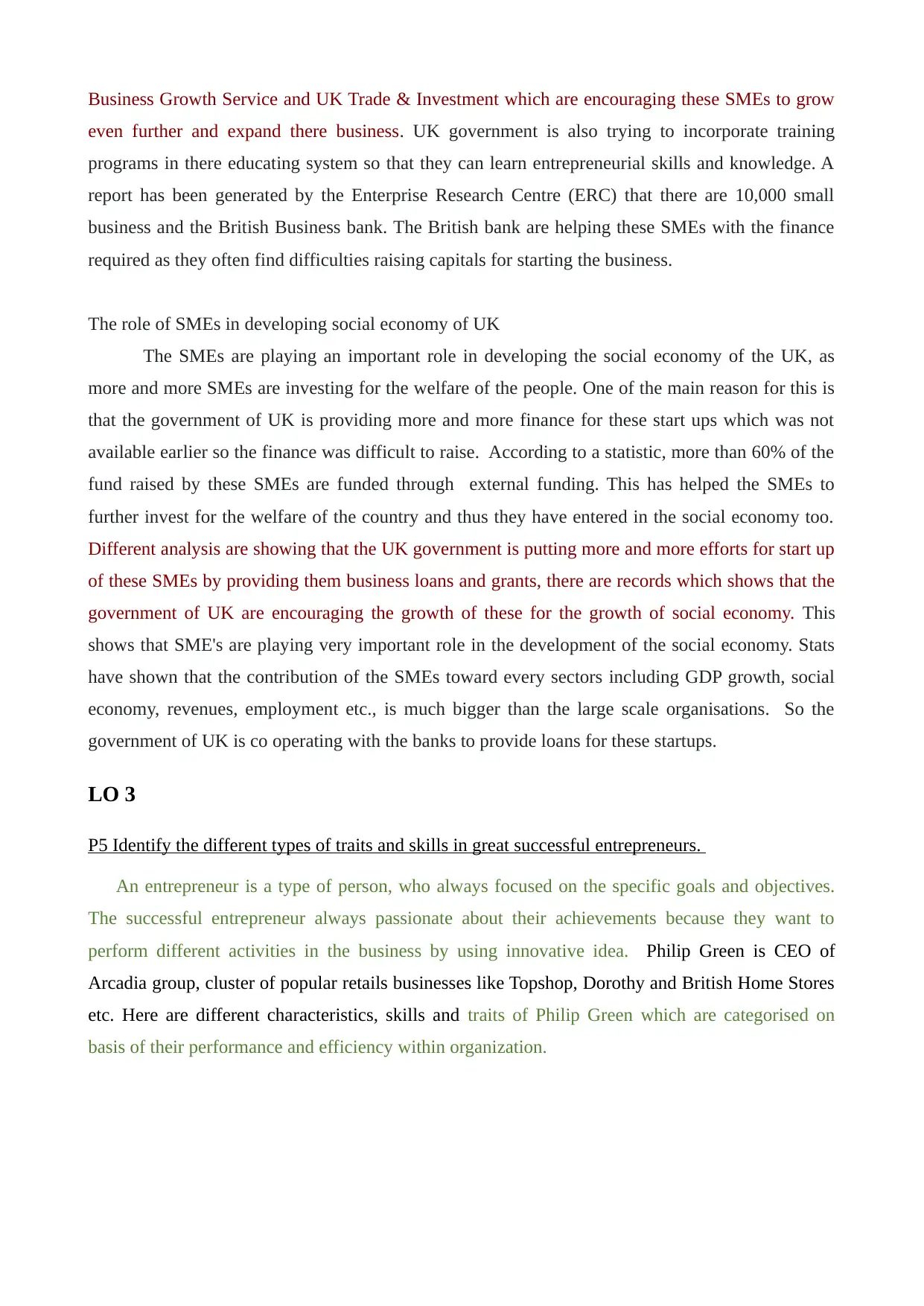
Business Growth Service and UK Trade & Investment which are encouraging these SMEs to grow
even further and expand there business. UK government is also trying to incorporate training
programs in there educating system so that they can learn entrepreneurial skills and knowledge. A
report has been generated by the Enterprise Research Centre (ERC) that there are 10,000 small
business and the British Business bank. The British bank are helping these SMEs with the finance
required as they often find difficulties raising capitals for starting the business.
The role of SMEs in developing social economy of UK
The SMEs are playing an important role in developing the social economy of the UK, as
more and more SMEs are investing for the welfare of the people. One of the main reason for this is
that the government of UK is providing more and more finance for these start ups which was not
available earlier so the finance was difficult to raise. According to a statistic, more than 60% of the
fund raised by these SMEs are funded through external funding. This has helped the SMEs to
further invest for the welfare of the country and thus they have entered in the social economy too.
Different analysis are showing that the UK government is putting more and more efforts for start up
of these SMEs by providing them business loans and grants, there are records which shows that the
government of UK are encouraging the growth of these for the growth of social economy. This
shows that SME's are playing very important role in the development of the social economy. Stats
have shown that the contribution of the SMEs toward every sectors including GDP growth, social
economy, revenues, employment etc., is much bigger than the large scale organisations. So the
government of UK is co operating with the banks to provide loans for these startups.
LO 3
P5 Identify the different types of traits and skills in great successful entrepreneurs.
An entrepreneur is a type of person, who always focused on the specific goals and objectives.
The successful entrepreneur always passionate about their achievements because they want to
perform different activities in the business by using innovative idea. Philip Green is CEO of
Arcadia group, cluster of popular retails businesses like Topshop, Dorothy and British Home Stores
etc. Here are different characteristics, skills and traits of Philip Green which are categorised on
basis of their performance and efficiency within organization.
even further and expand there business. UK government is also trying to incorporate training
programs in there educating system so that they can learn entrepreneurial skills and knowledge. A
report has been generated by the Enterprise Research Centre (ERC) that there are 10,000 small
business and the British Business bank. The British bank are helping these SMEs with the finance
required as they often find difficulties raising capitals for starting the business.
The role of SMEs in developing social economy of UK
The SMEs are playing an important role in developing the social economy of the UK, as
more and more SMEs are investing for the welfare of the people. One of the main reason for this is
that the government of UK is providing more and more finance for these start ups which was not
available earlier so the finance was difficult to raise. According to a statistic, more than 60% of the
fund raised by these SMEs are funded through external funding. This has helped the SMEs to
further invest for the welfare of the country and thus they have entered in the social economy too.
Different analysis are showing that the UK government is putting more and more efforts for start up
of these SMEs by providing them business loans and grants, there are records which shows that the
government of UK are encouraging the growth of these for the growth of social economy. This
shows that SME's are playing very important role in the development of the social economy. Stats
have shown that the contribution of the SMEs toward every sectors including GDP growth, social
economy, revenues, employment etc., is much bigger than the large scale organisations. So the
government of UK is co operating with the banks to provide loans for these startups.
LO 3
P5 Identify the different types of traits and skills in great successful entrepreneurs.
An entrepreneur is a type of person, who always focused on the specific goals and objectives.
The successful entrepreneur always passionate about their achievements because they want to
perform different activities in the business by using innovative idea. Philip Green is CEO of
Arcadia group, cluster of popular retails businesses like Topshop, Dorothy and British Home Stores
etc. Here are different characteristics, skills and traits of Philip Green which are categorised on
basis of their performance and efficiency within organization.
⊘ This is a preview!⊘
Do you want full access?
Subscribe today to unlock all pages.

Trusted by 1+ million students worldwide
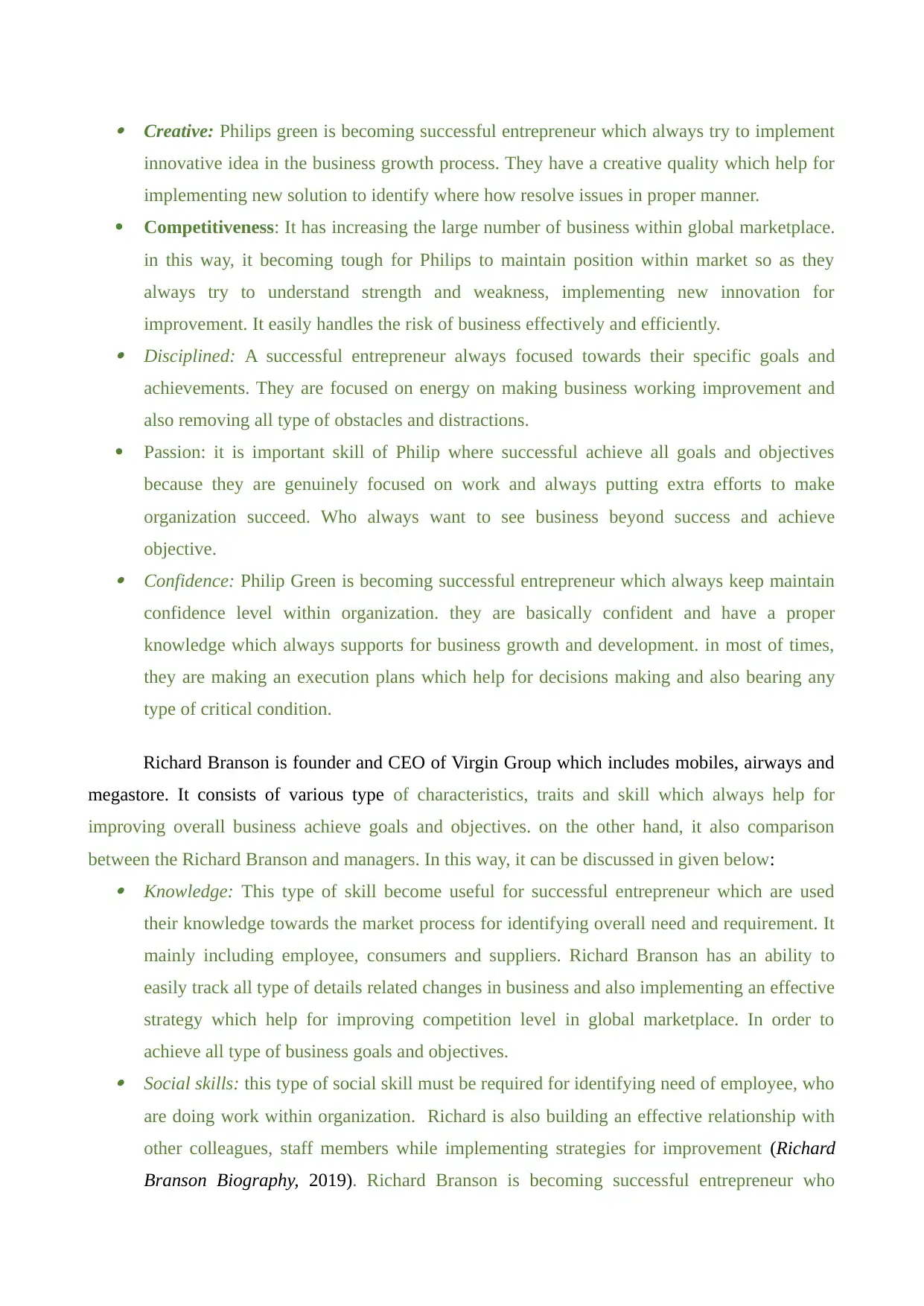
Creative: Philips green is becoming successful entrepreneur which always try to implement
innovative idea in the business growth process. They have a creative quality which help for
implementing new solution to identify where how resolve issues in proper manner.
Competitiveness: It has increasing the large number of business within global marketplace.
in this way, it becoming tough for Philips to maintain position within market so as they
always try to understand strength and weakness, implementing new innovation for
improvement. It easily handles the risk of business effectively and efficiently. Disciplined: A successful entrepreneur always focused towards their specific goals and
achievements. They are focused on energy on making business working improvement and
also removing all type of obstacles and distractions.
Passion: it is important skill of Philip where successful achieve all goals and objectives
because they are genuinely focused on work and always putting extra efforts to make
organization succeed. Who always want to see business beyond success and achieve
objective. Confidence: Philip Green is becoming successful entrepreneur which always keep maintain
confidence level within organization. they are basically confident and have a proper
knowledge which always supports for business growth and development. in most of times,
they are making an execution plans which help for decisions making and also bearing any
type of critical condition.
Richard Branson is founder and CEO of Virgin Group which includes mobiles, airways and
megastore. It consists of various type of characteristics, traits and skill which always help for
improving overall business achieve goals and objectives. on the other hand, it also comparison
between the Richard Branson and managers. In this way, it can be discussed in given below: Knowledge: This type of skill become useful for successful entrepreneur which are used
their knowledge towards the market process for identifying overall need and requirement. It
mainly including employee, consumers and suppliers. Richard Branson has an ability to
easily track all type of details related changes in business and also implementing an effective
strategy which help for improving competition level in global marketplace. In order to
achieve all type of business goals and objectives. Social skills: this type of social skill must be required for identifying need of employee, who
are doing work within organization. Richard is also building an effective relationship with
other colleagues, staff members while implementing strategies for improvement (Richard
Branson Biography, 2019). Richard Branson is becoming successful entrepreneur who
innovative idea in the business growth process. They have a creative quality which help for
implementing new solution to identify where how resolve issues in proper manner.
Competitiveness: It has increasing the large number of business within global marketplace.
in this way, it becoming tough for Philips to maintain position within market so as they
always try to understand strength and weakness, implementing new innovation for
improvement. It easily handles the risk of business effectively and efficiently. Disciplined: A successful entrepreneur always focused towards their specific goals and
achievements. They are focused on energy on making business working improvement and
also removing all type of obstacles and distractions.
Passion: it is important skill of Philip where successful achieve all goals and objectives
because they are genuinely focused on work and always putting extra efforts to make
organization succeed. Who always want to see business beyond success and achieve
objective. Confidence: Philip Green is becoming successful entrepreneur which always keep maintain
confidence level within organization. they are basically confident and have a proper
knowledge which always supports for business growth and development. in most of times,
they are making an execution plans which help for decisions making and also bearing any
type of critical condition.
Richard Branson is founder and CEO of Virgin Group which includes mobiles, airways and
megastore. It consists of various type of characteristics, traits and skill which always help for
improving overall business achieve goals and objectives. on the other hand, it also comparison
between the Richard Branson and managers. In this way, it can be discussed in given below: Knowledge: This type of skill become useful for successful entrepreneur which are used
their knowledge towards the market process for identifying overall need and requirement. It
mainly including employee, consumers and suppliers. Richard Branson has an ability to
easily track all type of details related changes in business and also implementing an effective
strategy which help for improving competition level in global marketplace. In order to
achieve all type of business goals and objectives. Social skills: this type of social skill must be required for identifying need of employee, who
are doing work within organization. Richard is also building an effective relationship with
other colleagues, staff members while implementing strategies for improvement (Richard
Branson Biography, 2019). Richard Branson is becoming successful entrepreneur who
Paraphrase This Document
Need a fresh take? Get an instant paraphrase of this document with our AI Paraphraser
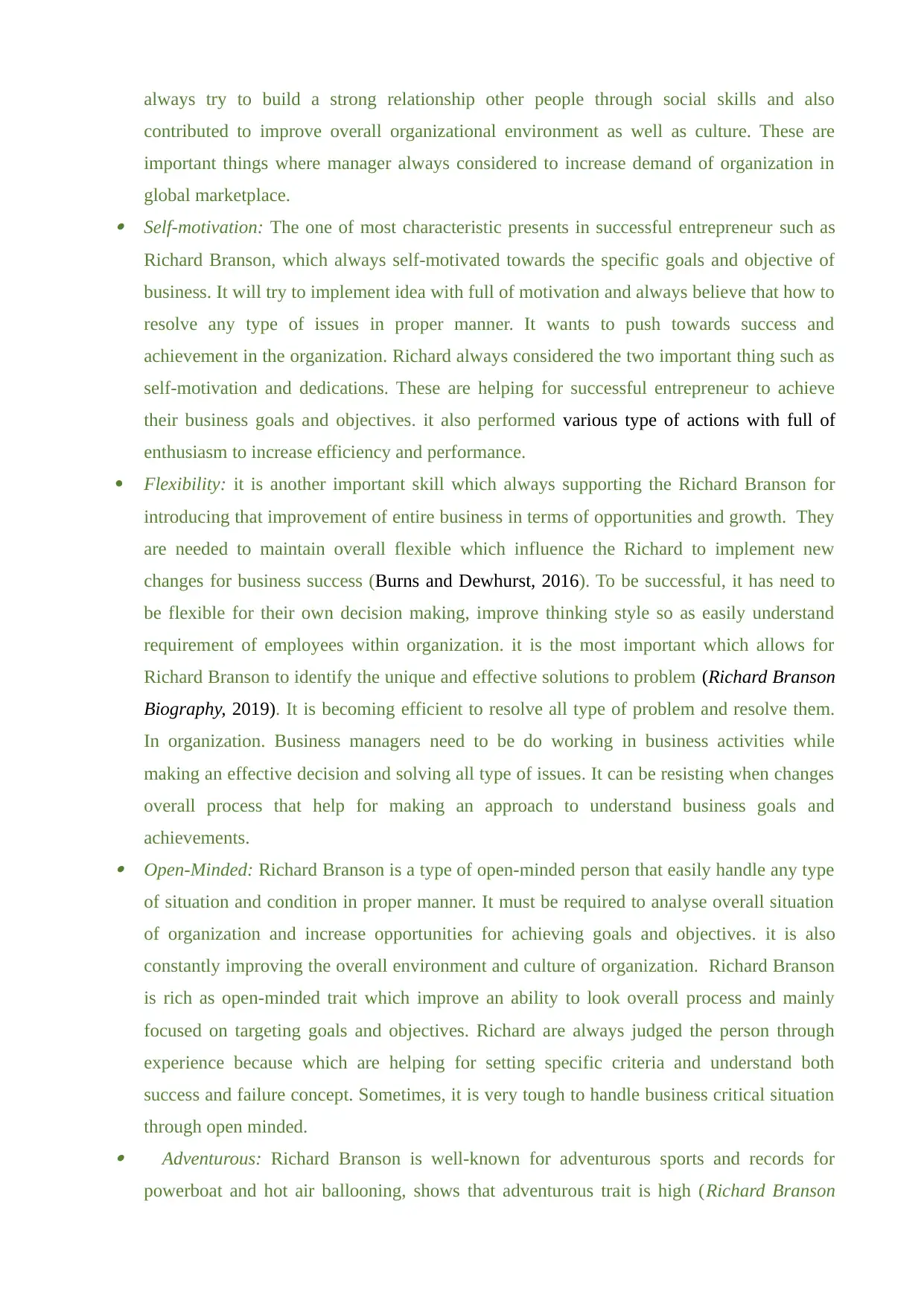
always try to build a strong relationship other people through social skills and also
contributed to improve overall organizational environment as well as culture. These are
important things where manager always considered to increase demand of organization in
global marketplace. Self-motivation: The one of most characteristic presents in successful entrepreneur such as
Richard Branson, which always self-motivated towards the specific goals and objective of
business. It will try to implement idea with full of motivation and always believe that how to
resolve any type of issues in proper manner. It wants to push towards success and
achievement in the organization. Richard always considered the two important thing such as
self-motivation and dedications. These are helping for successful entrepreneur to achieve
their business goals and objectives. it also performed various type of actions with full of
enthusiasm to increase efficiency and performance.
Flexibility: it is another important skill which always supporting the Richard Branson for
introducing that improvement of entire business in terms of opportunities and growth. They
are needed to maintain overall flexible which influence the Richard to implement new
changes for business success (Burns and Dewhurst, 2016). To be successful, it has need to
be flexible for their own decision making, improve thinking style so as easily understand
requirement of employees within organization. it is the most important which allows for
Richard Branson to identify the unique and effective solutions to problem (Richard Branson
Biography, 2019). It is becoming efficient to resolve all type of problem and resolve them.
In organization. Business managers need to be do working in business activities while
making an effective decision and solving all type of issues. It can be resisting when changes
overall process that help for making an approach to understand business goals and
achievements. Open-Minded: Richard Branson is a type of open-minded person that easily handle any type
of situation and condition in proper manner. It must be required to analyse overall situation
of organization and increase opportunities for achieving goals and objectives. it is also
constantly improving the overall environment and culture of organization. Richard Branson
is rich as open-minded trait which improve an ability to look overall process and mainly
focused on targeting goals and objectives. Richard are always judged the person through
experience because which are helping for setting specific criteria and understand both
success and failure concept. Sometimes, it is very tough to handle business critical situation
through open minded. Adventurous: Richard Branson is well-known for adventurous sports and records for
powerboat and hot air ballooning, shows that adventurous trait is high (Richard Branson
contributed to improve overall organizational environment as well as culture. These are
important things where manager always considered to increase demand of organization in
global marketplace. Self-motivation: The one of most characteristic presents in successful entrepreneur such as
Richard Branson, which always self-motivated towards the specific goals and objective of
business. It will try to implement idea with full of motivation and always believe that how to
resolve any type of issues in proper manner. It wants to push towards success and
achievement in the organization. Richard always considered the two important thing such as
self-motivation and dedications. These are helping for successful entrepreneur to achieve
their business goals and objectives. it also performed various type of actions with full of
enthusiasm to increase efficiency and performance.
Flexibility: it is another important skill which always supporting the Richard Branson for
introducing that improvement of entire business in terms of opportunities and growth. They
are needed to maintain overall flexible which influence the Richard to implement new
changes for business success (Burns and Dewhurst, 2016). To be successful, it has need to
be flexible for their own decision making, improve thinking style so as easily understand
requirement of employees within organization. it is the most important which allows for
Richard Branson to identify the unique and effective solutions to problem (Richard Branson
Biography, 2019). It is becoming efficient to resolve all type of problem and resolve them.
In organization. Business managers need to be do working in business activities while
making an effective decision and solving all type of issues. It can be resisting when changes
overall process that help for making an approach to understand business goals and
achievements. Open-Minded: Richard Branson is a type of open-minded person that easily handle any type
of situation and condition in proper manner. It must be required to analyse overall situation
of organization and increase opportunities for achieving goals and objectives. it is also
constantly improving the overall environment and culture of organization. Richard Branson
is rich as open-minded trait which improve an ability to look overall process and mainly
focused on targeting goals and objectives. Richard are always judged the person through
experience because which are helping for setting specific criteria and understand both
success and failure concept. Sometimes, it is very tough to handle business critical situation
through open minded. Adventurous: Richard Branson is well-known for adventurous sports and records for
powerboat and hot air ballooning, shows that adventurous trait is high (Richard Branson
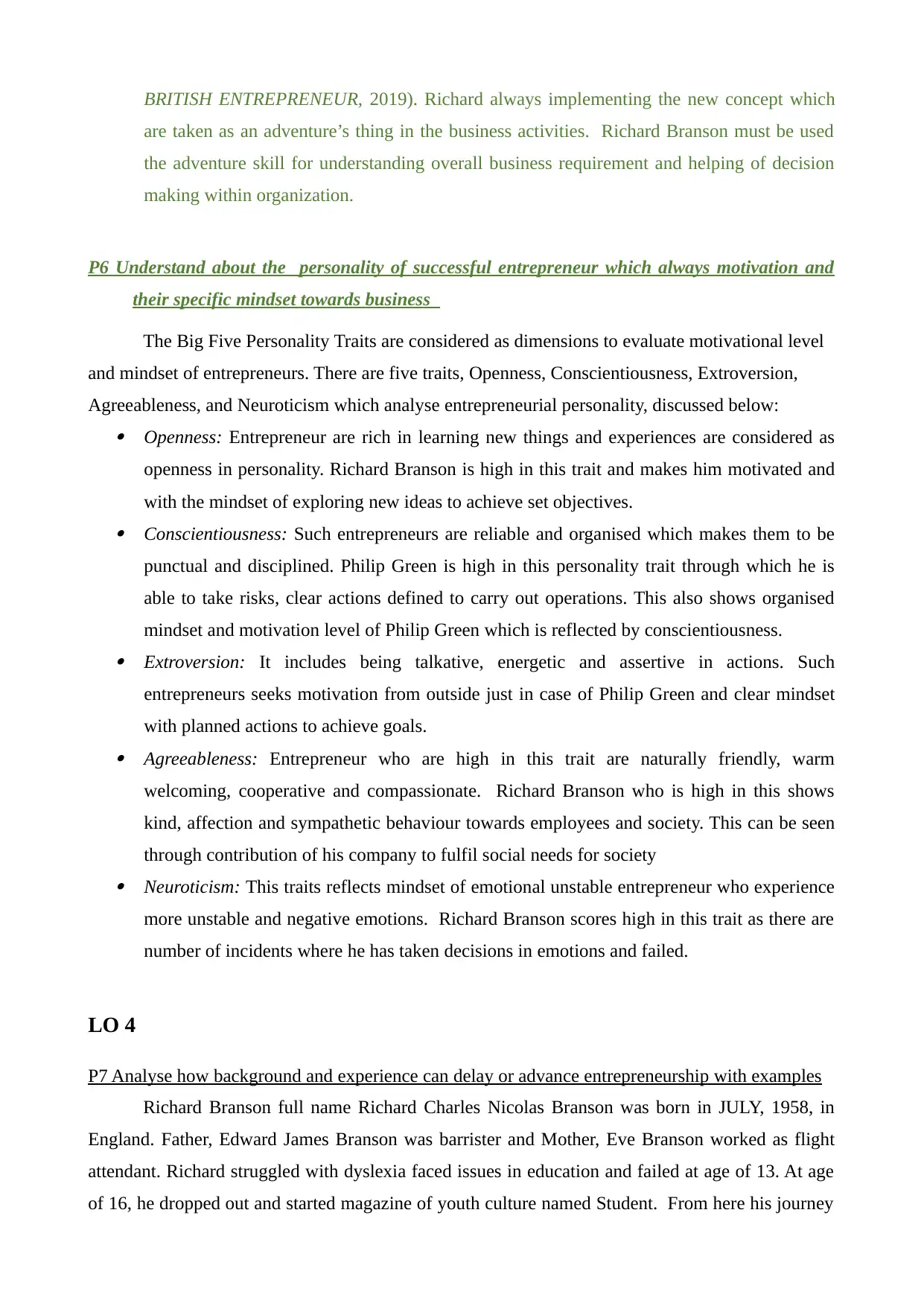
BRITISH ENTREPRENEUR, 2019). Richard always implementing the new concept which
are taken as an adventure’s thing in the business activities. Richard Branson must be used
the adventure skill for understanding overall business requirement and helping of decision
making within organization.
P6 Understand about the personality of successful entrepreneur which always motivation and
their specific mindset towards business
The Big Five Personality Traits are considered as dimensions to evaluate motivational level
and mindset of entrepreneurs. There are five traits, Openness, Conscientiousness, Extroversion,
Agreeableness, and Neuroticism which analyse entrepreneurial personality, discussed below: Openness: Entrepreneur are rich in learning new things and experiences are considered as
openness in personality. Richard Branson is high in this trait and makes him motivated and
with the mindset of exploring new ideas to achieve set objectives. Conscientiousness: Such entrepreneurs are reliable and organised which makes them to be
punctual and disciplined. Philip Green is high in this personality trait through which he is
able to take risks, clear actions defined to carry out operations. This also shows organised
mindset and motivation level of Philip Green which is reflected by conscientiousness. Extroversion: It includes being talkative, energetic and assertive in actions. Such
entrepreneurs seeks motivation from outside just in case of Philip Green and clear mindset
with planned actions to achieve goals. Agreeableness: Entrepreneur who are high in this trait are naturally friendly, warm
welcoming, cooperative and compassionate. Richard Branson who is high in this shows
kind, affection and sympathetic behaviour towards employees and society. This can be seen
through contribution of his company to fulfil social needs for society Neuroticism: This traits reflects mindset of emotional unstable entrepreneur who experience
more unstable and negative emotions. Richard Branson scores high in this trait as there are
number of incidents where he has taken decisions in emotions and failed.
LO 4
P7 Analyse how background and experience can delay or advance entrepreneurship with examples
Richard Branson full name Richard Charles Nicolas Branson was born in JULY, 1958, in
England. Father, Edward James Branson was barrister and Mother, Eve Branson worked as flight
attendant. Richard struggled with dyslexia faced issues in education and failed at age of 13. At age
of 16, he dropped out and started magazine of youth culture named Student. From here his journey
are taken as an adventure’s thing in the business activities. Richard Branson must be used
the adventure skill for understanding overall business requirement and helping of decision
making within organization.
P6 Understand about the personality of successful entrepreneur which always motivation and
their specific mindset towards business
The Big Five Personality Traits are considered as dimensions to evaluate motivational level
and mindset of entrepreneurs. There are five traits, Openness, Conscientiousness, Extroversion,
Agreeableness, and Neuroticism which analyse entrepreneurial personality, discussed below: Openness: Entrepreneur are rich in learning new things and experiences are considered as
openness in personality. Richard Branson is high in this trait and makes him motivated and
with the mindset of exploring new ideas to achieve set objectives. Conscientiousness: Such entrepreneurs are reliable and organised which makes them to be
punctual and disciplined. Philip Green is high in this personality trait through which he is
able to take risks, clear actions defined to carry out operations. This also shows organised
mindset and motivation level of Philip Green which is reflected by conscientiousness. Extroversion: It includes being talkative, energetic and assertive in actions. Such
entrepreneurs seeks motivation from outside just in case of Philip Green and clear mindset
with planned actions to achieve goals. Agreeableness: Entrepreneur who are high in this trait are naturally friendly, warm
welcoming, cooperative and compassionate. Richard Branson who is high in this shows
kind, affection and sympathetic behaviour towards employees and society. This can be seen
through contribution of his company to fulfil social needs for society Neuroticism: This traits reflects mindset of emotional unstable entrepreneur who experience
more unstable and negative emotions. Richard Branson scores high in this trait as there are
number of incidents where he has taken decisions in emotions and failed.
LO 4
P7 Analyse how background and experience can delay or advance entrepreneurship with examples
Richard Branson full name Richard Charles Nicolas Branson was born in JULY, 1958, in
England. Father, Edward James Branson was barrister and Mother, Eve Branson worked as flight
attendant. Richard struggled with dyslexia faced issues in education and failed at age of 13. At age
of 16, he dropped out and started magazine of youth culture named Student. From here his journey
⊘ This is a preview!⊘
Do you want full access?
Subscribe today to unlock all pages.

Trusted by 1+ million students worldwide
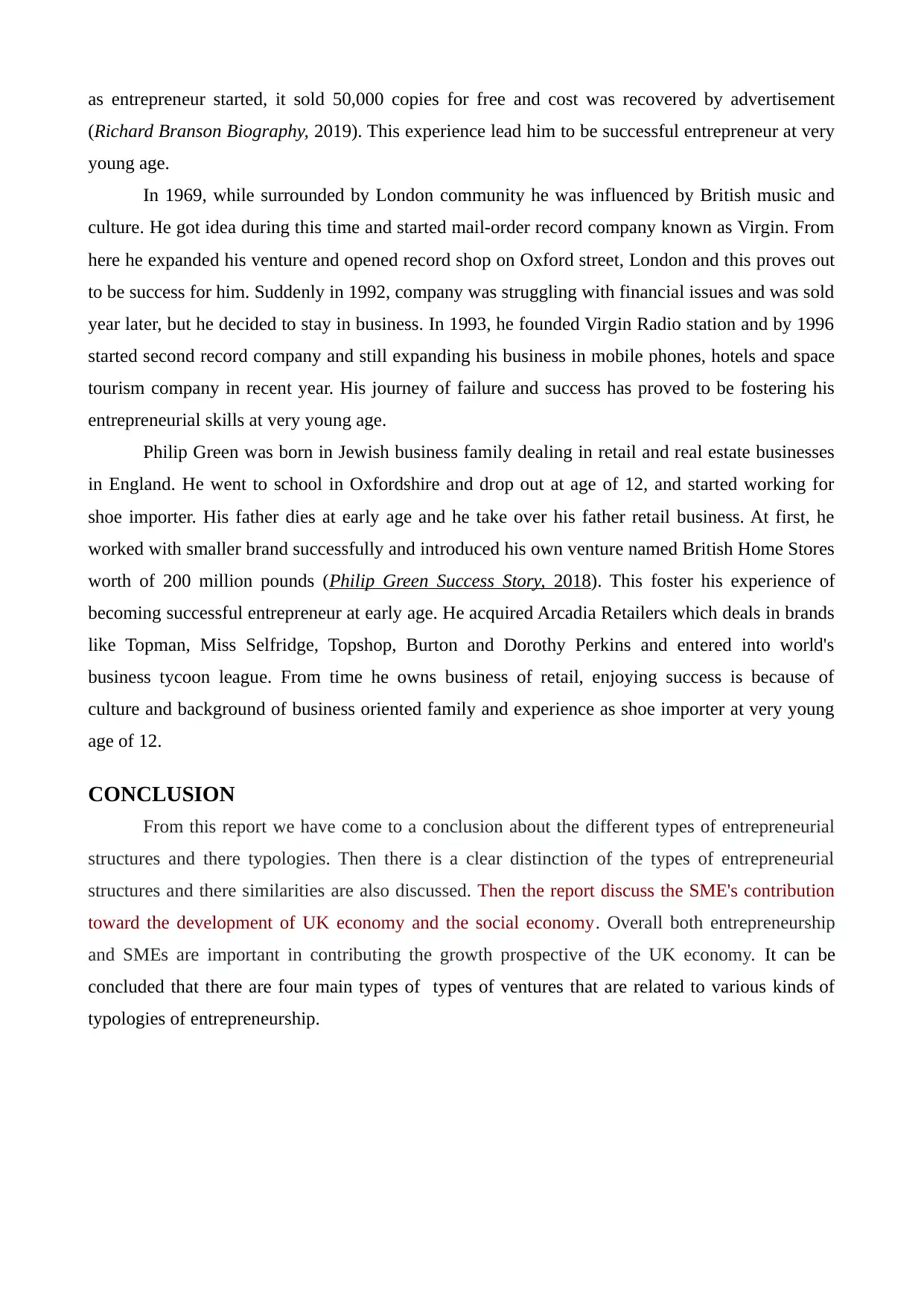
as entrepreneur started, it sold 50,000 copies for free and cost was recovered by advertisement
(Richard Branson Biography, 2019). This experience lead him to be successful entrepreneur at very
young age.
In 1969, while surrounded by London community he was influenced by British music and
culture. He got idea during this time and started mail-order record company known as Virgin. From
here he expanded his venture and opened record shop on Oxford street, London and this proves out
to be success for him. Suddenly in 1992, company was struggling with financial issues and was sold
year later, but he decided to stay in business. In 1993, he founded Virgin Radio station and by 1996
started second record company and still expanding his business in mobile phones, hotels and space
tourism company in recent year. His journey of failure and success has proved to be fostering his
entrepreneurial skills at very young age.
Philip Green was born in Jewish business family dealing in retail and real estate businesses
in England. He went to school in Oxfordshire and drop out at age of 12, and started working for
shoe importer. His father dies at early age and he take over his father retail business. At first, he
worked with smaller brand successfully and introduced his own venture named British Home Stores
worth of 200 million pounds (Philip Green Success Story, 2018). This foster his experience of
becoming successful entrepreneur at early age. He acquired Arcadia Retailers which deals in brands
like Topman, Miss Selfridge, Topshop, Burton and Dorothy Perkins and entered into world's
business tycoon league. From time he owns business of retail, enjoying success is because of
culture and background of business oriented family and experience as shoe importer at very young
age of 12.
CONCLUSION
From this report we have come to a conclusion about the different types of entrepreneurial
structures and there typologies. Then there is a clear distinction of the types of entrepreneurial
structures and there similarities are also discussed. Then the report discuss the SME's contribution
toward the development of UK economy and the social economy. Overall both entrepreneurship
and SMEs are important in contributing the growth prospective of the UK economy. It can be
concluded that there are four main types of types of ventures that are related to various kinds of
typologies of entrepreneurship.
(Richard Branson Biography, 2019). This experience lead him to be successful entrepreneur at very
young age.
In 1969, while surrounded by London community he was influenced by British music and
culture. He got idea during this time and started mail-order record company known as Virgin. From
here he expanded his venture and opened record shop on Oxford street, London and this proves out
to be success for him. Suddenly in 1992, company was struggling with financial issues and was sold
year later, but he decided to stay in business. In 1993, he founded Virgin Radio station and by 1996
started second record company and still expanding his business in mobile phones, hotels and space
tourism company in recent year. His journey of failure and success has proved to be fostering his
entrepreneurial skills at very young age.
Philip Green was born in Jewish business family dealing in retail and real estate businesses
in England. He went to school in Oxfordshire and drop out at age of 12, and started working for
shoe importer. His father dies at early age and he take over his father retail business. At first, he
worked with smaller brand successfully and introduced his own venture named British Home Stores
worth of 200 million pounds (Philip Green Success Story, 2018). This foster his experience of
becoming successful entrepreneur at early age. He acquired Arcadia Retailers which deals in brands
like Topman, Miss Selfridge, Topshop, Burton and Dorothy Perkins and entered into world's
business tycoon league. From time he owns business of retail, enjoying success is because of
culture and background of business oriented family and experience as shoe importer at very young
age of 12.
CONCLUSION
From this report we have come to a conclusion about the different types of entrepreneurial
structures and there typologies. Then there is a clear distinction of the types of entrepreneurial
structures and there similarities are also discussed. Then the report discuss the SME's contribution
toward the development of UK economy and the social economy. Overall both entrepreneurship
and SMEs are important in contributing the growth prospective of the UK economy. It can be
concluded that there are four main types of types of ventures that are related to various kinds of
typologies of entrepreneurship.
Paraphrase This Document
Need a fresh take? Get an instant paraphrase of this document with our AI Paraphraser

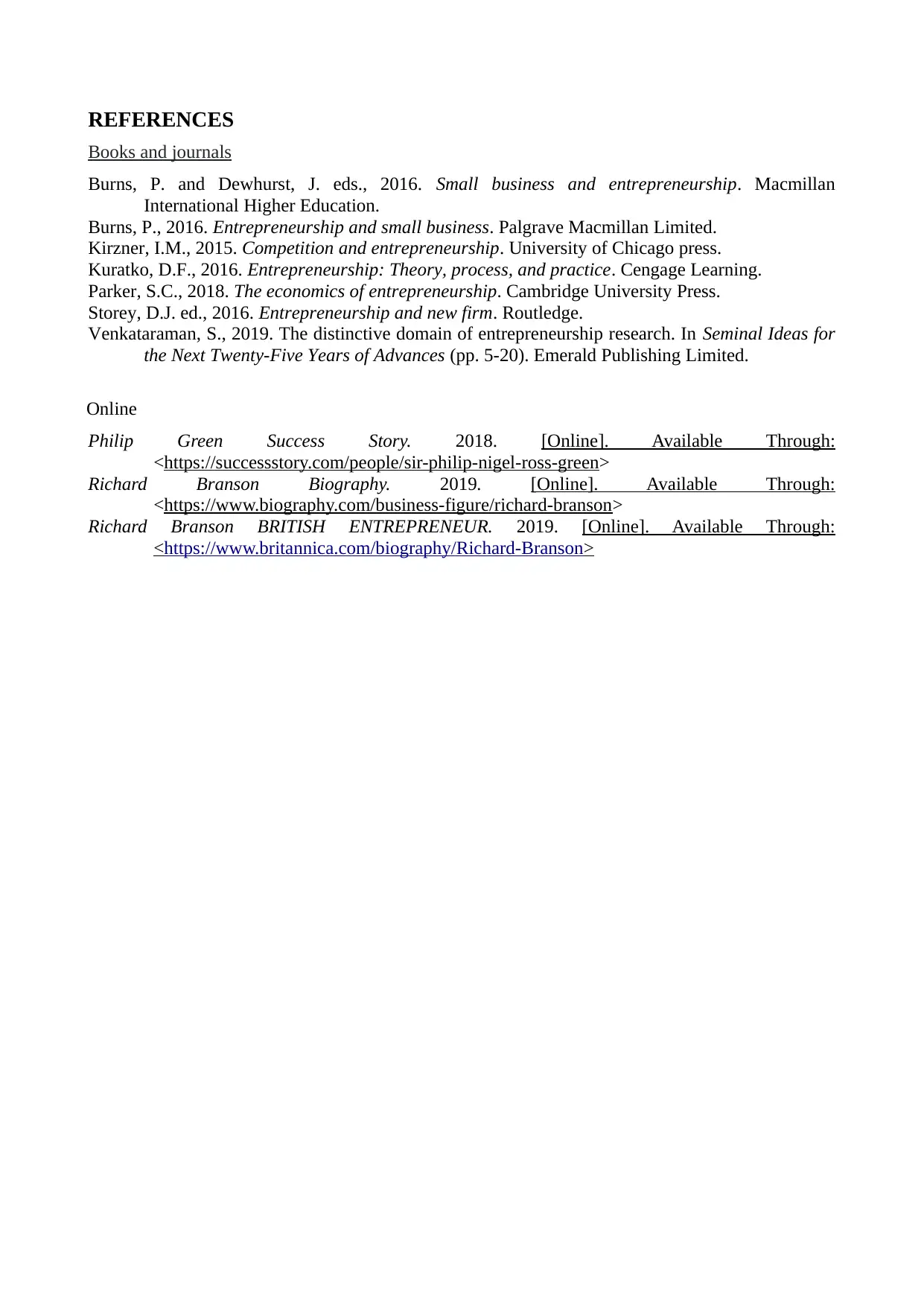
REFERENCES
Books and journals
Burns, P. and Dewhurst, J. eds., 2016. Small business and entrepreneurship. Macmillan
International Higher Education.
Burns, P., 2016. Entrepreneurship and small business. Palgrave Macmillan Limited.
Kirzner, I.M., 2015. Competition and entrepreneurship. University of Chicago press.
Kuratko, D.F., 2016. Entrepreneurship: Theory, process, and practice. Cengage Learning.
Parker, S.C., 2018. The economics of entrepreneurship. Cambridge University Press.
Storey, D.J. ed., 2016. Entrepreneurship and new firm. Routledge.
Venkataraman, S., 2019. The distinctive domain of entrepreneurship research. In Seminal Ideas for
the Next Twenty-Five Years of Advances (pp. 5-20). Emerald Publishing Limited.
Online
Philip Green Success Story. 2018. [Online]. Available Through:
<https://successstory.com/people/sir-philip-nigel-ross-green>
Richard Branson Biography. 2019. [Online]. Available Through:
<https://www.biography.com/business-figure/richard-branson>
Richard Branson BRITISH ENTREPRENEUR. 2019. [Online]. Available Through:
<https://www.britannica.com/biography/Richard-Branson>
Books and journals
Burns, P. and Dewhurst, J. eds., 2016. Small business and entrepreneurship. Macmillan
International Higher Education.
Burns, P., 2016. Entrepreneurship and small business. Palgrave Macmillan Limited.
Kirzner, I.M., 2015. Competition and entrepreneurship. University of Chicago press.
Kuratko, D.F., 2016. Entrepreneurship: Theory, process, and practice. Cengage Learning.
Parker, S.C., 2018. The economics of entrepreneurship. Cambridge University Press.
Storey, D.J. ed., 2016. Entrepreneurship and new firm. Routledge.
Venkataraman, S., 2019. The distinctive domain of entrepreneurship research. In Seminal Ideas for
the Next Twenty-Five Years of Advances (pp. 5-20). Emerald Publishing Limited.
Online
Philip Green Success Story. 2018. [Online]. Available Through:
<https://successstory.com/people/sir-philip-nigel-ross-green>
Richard Branson Biography. 2019. [Online]. Available Through:
<https://www.biography.com/business-figure/richard-branson>
Richard Branson BRITISH ENTREPRENEUR. 2019. [Online]. Available Through:
<https://www.britannica.com/biography/Richard-Branson>
⊘ This is a preview!⊘
Do you want full access?
Subscribe today to unlock all pages.

Trusted by 1+ million students worldwide
1 out of 12
Related Documents
Your All-in-One AI-Powered Toolkit for Academic Success.
+13062052269
info@desklib.com
Available 24*7 on WhatsApp / Email
![[object Object]](/_next/static/media/star-bottom.7253800d.svg)
Unlock your academic potential
Copyright © 2020–2026 A2Z Services. All Rights Reserved. Developed and managed by ZUCOL.





